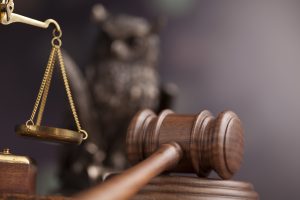HEARSAY: ADMISSIBILITY OF OUT OF COURT STATEMENTS
- Comments Off on HEARSAY: ADMISSIBILITY OF OUT OF COURT STATEMENTS

In the words of trial advocacy experts, Peter Murphy and D. Barnard, “the rule against hearsay ranks as one of the law’s most celebrated nightmares.” And, it’s true! Even for seasoned attorneys, mastering the rule against hearsay and all of its’ exceptions is a difficult task. However, we think understanding hearsay is a little easier when you remember the reason why most hearsay is banned from trial—to force litigants to present the best possible testimony in the courtroom based on facts and not secondhand accounts. The idea is that firsthand reports are more reliable than…well…hearsay. Hearsay—whether it is admitted into evidence or not—can affect your case. The real nightmare, we suggest, is for an innocent person to be convicted of an offense based on unreliable information.
WHAT IS HEARSAY?
Under Georgia law and in line with federal law, “hearsay” means a statement, other than one made by the declarant while testifying at the trial or hearing, offered in evidence to prove the truth of the matter asserted. O.C.G.A. § 24-8-801(c). A “statement” means: (1) an oral or written assertion; or, (2) nonverbal conduct of a person, if it is intended by the person as an assertion. Now, you may be asking yourself, what is a declarant? A declarant is the person who makes a statement based on firsthand knowledge and any statement is potential hearsay unless it is made by a declarant on the witness stand.
Let’s say you and your friend, Jane, are out for an evening jog. You two stop at an intersection to catch your breath. While there, you two witness a drive-by shooting. You are subpoenaed to testify in court about the incident, but Jane is not. It’s perfectly fine for you to testify to what you witnessed. However, you wouldn’t be allowed to testify to what Jane said she saw. Because Jane isn’t there to be questioned under oath and to confirm what she witnessed, your account of what Jane saw would be a secondhand report.
WHY FIRSTHAND TESTIMONY IS PREFERRED TO SECONDHAND REPORTS?
Authors of Learning Evidence: From the Federal Rules to the Courtroom, Deborah Jones Merritt and Ric Simmons, theorize that firsthand testimony is preferred to secondhand reporting because:
- Secondhand testimony doubles the possibility that one of the reporters is mistaken or lying;
- Firsthand testimony can be tested by cross-examination;
- The finder of fact (the jurors or the judge) can better evaluate the confidence and sincerity of information if they can watch the individual testify to it firsthand; and,
- At trial, firsthand testimony is made under oath in a formal, solemn setting.
HEARSAY EXCLUSIONS AND CONDITIONS UNDER GEORGIA LAW
Under Georgia law, O.C.G.A. § 24-8-801, hearsay shall be subject to the following exclusions and conditions:
(1) Prior statement by witness.
(A) An out-of-court statement shall not be hearsay if the declarant testifies at the trial or hearing, is subject to cross-examination concerning the statement, and the statement is admissible as a prior inconsistent statement or a prior consistent statement;
(B) If a hearsay statement is admitted and the declarant does not testify at the trial or hearing, other out-of-court statements of the declarant shall be admissible for the limited use of impeaching or rehabilitating the credibility of the declarant, and not as substantive evidence, if the other statements qualify as prior inconsistent statements or prior consistent statements;
(C) A statement shall not be hearsay if the declarant testifies at the trial or hearing and is subject to cross-examination concerning the statement, and the statement is one of identification of a person made after perceiving the person; and,
(2) Admissions by party-opponent.
Admissions shall not be excluded by the hearsay rule. An admission is a statement offered against a party which is:
(A) The party’s own statement, in either an individual or representative capacity;
(B) A statement of which the party has manifested an adoption or belief in its truth;
(C) A statement by a person authorized by the party to make a statement concerning the subject;
(D) A statement by the party’s agent or employee, but not including any agent of the state in a criminal proceeding, concerning a matter within the scope of the agency or employment, made during the existence of the relationship; or,
(E) A statement by a coconspirator of a party during the course and in furtherance of the conspiracy, including a statement made during the concealment phase of a conspiracy. A conspiracy need not be charged in order to make a statement admissible under this subparagraph.
WHAT IF YOUR LAWYER FAILS TO OBJECT TO HEARSAY?
Under Georgia law, O.C.G.A. § 24-8-802, hearsay shall not be admissible except as provided by this article. However, if a party does not properly object to hearsay, the objection shall be deemed waived, and the hearsay evidence shall be legal evidence and admissible. So, make sure you hire an experienced criminal lawyer who knows the rule against hearsay inside-out!
CONTACT BIXON LAW TODAY
If you or a loved one have been arrested and charged with a crime, call Bixon Law today. You need an experienced Georgia criminal defense lawyer who will defend your legal rights and vigorously advocate on your behalf to have your case dismissed or the charges against you reduced. As experienced trial attorneys, we are also not afraid to take your case to trial if necessary. We represent clients in Atlanta and throughout the state of Georgia. We are lawyers who are committed to helping people in difficult situations and we invite you to call us at 404-551-5684 for a free consultation today.









